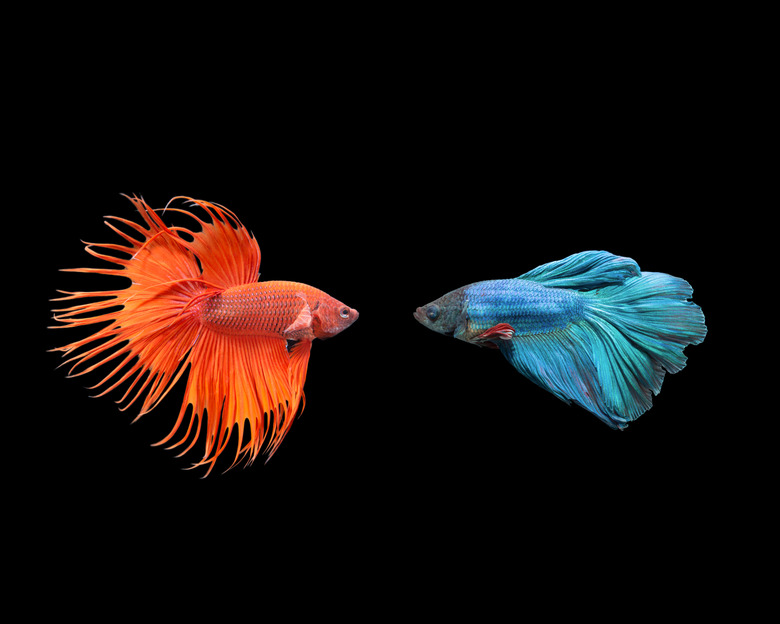Science Projects Using A Betta Fish
The Betta genus actually contains more than 50 species. The most popular Betta among aquarists is the Siamese Fighting Fish, known for its striking colors and aggressive behavior. However, not all Bettas are aggressive. For example, there is the Betta imbellis, commonly known as the Peaceful Betta. However, for the purpose of science projects, the Siamese Fighting Fish, due to its combative personality, provides the most intriguing possibilities.
Influence of Lighting on Bettas
Influence of Lighting on Bettas
To determine how different types of lighting affect Betta fish, this study should be conducted for at least six months or longer. Use two tanks with one Betta in each tank. Start with young fish, so you can monitor their growth under various lighting conditions. It is important, however, not to do anything that is harmful or cruel to your fish. Change the type of lighting in the tanks every two to three months, but don't use light that is too intense. (Consult with your local fish store expert for guidance.) Use incandescent, fluorescent, and halide. Note the Bettas' behavior, feeding habits, coloration and growth patterns under each lighting condition and record your observations.
Impact of Music on Betta Behavior
Impact of Music on Betta Behavior
Conduct an experiment to see how music affects Betta fish. Place several fish in individual identical tanks in a quiet location. Maintain precise variables for all the fish, such as common lighting, temperature and feeding. For several weeks spend 30 to 60 minutes a day observing the fish. Where do they spend most of their time? Are they consistently mobile or more static?
Next, play classical music as you make your observations, noting the fish's behavior. (Use the same piece of music at the same volume each day.) Wait a week and then repeat the same test using rock music. Note if the different music genres caused any change in their feeding habits, aggressiveness and coloration.
Betta Fish Aggression
Betta Fish Aggression
To find out if Bettas are less aggressive in large tanks, you'll need three male Bettas, three 1/2-gallon tanks and three larger (10 to 20 gallon) tanks. Place each Betta into an individual 1/2-gallon tank and allow them to acclimate for about a week. Place mirrors on the side of the tanks. Time the Betta from his first sign of aggression — he will swim toward the mirror fanning his fins — to the time he swims back to other side of the aquarium. Remove the mirrors and time how long his fins remained frilled and add these two times together. Repeat this test every four days. Average the times for each fish. Next, place the fish in the larger tanks and repeat the procedures, averaging those times. Divide the averages from the second test by the averages in the first test to determine the amount of changed aggression. Keep all lighting, temperature, feeding the same throughout the experiment.
Do Betta React to Colors or Shape?
Do Betta React to Colors or Shape?
Are male Bettas aggressive to certain shapes, colors, or species? Purchase two male Bettas (each in a separate Betta bowl) and place them out of sight of each other for about a week before you begin the project. Then place the two bowls next to each other. They will likely exhibit aggressive behavior by "puffing" up and fanning their fins. Separate the bowls. Next, fill two other similar bowls with water and place various "fake" fish inside them, purchased from a craft or toy store, or use goldfish. Place these bowls next to your Bettas and observe their reactions to the various types of fake fish and goldfish. Do certain colors, sizes, or species illicit a reaction?
Cite This Article
MLA
Dumas, Robert. "Science Projects Using A Betta Fish" sciencing.com, https://www.sciencing.com/science-projects-using-betta-fish-7968901/. 22 November 2019.
APA
Dumas, Robert. (2019, November 22). Science Projects Using A Betta Fish. sciencing.com. Retrieved from https://www.sciencing.com/science-projects-using-betta-fish-7968901/
Chicago
Dumas, Robert. Science Projects Using A Betta Fish last modified August 30, 2022. https://www.sciencing.com/science-projects-using-betta-fish-7968901/
